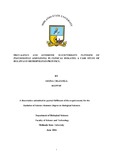Please use this identifier to cite or link to this item:
https://cris.library.msu.ac.zw//handle/11408/2806| Title: | Prevalence and antibiotic susceptibility patterns of Pseudomonas aeruginosa in clinical isolates: a case study of Bulawayo metropolitan province | Authors: | Chazanga, Leona | Keywords: | Pseudomonas aeruginosa Grain |
Issue Date: | 2016 | Publisher: | Midlands State University | Abstract: | Pseudomonas aeruginosa is gram negative bacterium which causes nosocomial infections in patients and is highly resistant to most antibiotics as it possess numerous mechanisms of resistance. These mechanisms possessed by P. aeruginosa make it difficult to treat in infections thus being of medical concern. A study was carried out to determine the prevalence and antibiotic susceptibility patterns of P. aeruginosa isolated from wound pus and urine samples. A total of 1200 primary cultured samples from patients with urinary tract and wound infections were screened for P. aeruginosa at two medical laboratories (Diagnostics Laboratory Services and Southern Pathology Laboratory) in Bulawayo from July 2015 to January 2016. P. aeruginosa was identified using standard biochemical tests according to Clinical Laboratory Standards Institute (CLSI) guidelines and its antibiotic susceptibility patterns to eight different antibiotics (Imipenem, Piperacillin, Piperacillin/Tazobactam, Ciprofloxacin, Norfloxacin, Gentamicin, Ceftriaxone, and Tetracycline) were determined using antibiotic zone diameters. A total of 78 samples tested positive for P. aeruginosa giving an overall prevalence of 6.5%. The prevalence of P. aeruginosa was higher in male patients (61.54%) than in female patients (38.46%). The eight antibiotics tested had significantly different efficacies against the P. aeruginosa isolates obtained from pus swab samples Chisquare P=0.000). Imipenem was the most effective drug on the P. aeruginosa isolated rom pus swabs (88.1%). Norfloxacin, Tetracycline, Gentamicin and Ceftriaxone were the least effective drugs on P. aeruginosa and had the same efficacy against the P. aeruginosa isolates obtained from pus swab samples (P=0.591). Therefore, the latter four antibiotics may not be considered as treatment options for P. aeruginosa mediated wound infections. However, Piperacillin, Piperacillin/Tazobactam and Ciprofloxacin can be used as alternative treatment options for P. aeruginosa mediated wound infections. In terms of their efficacy against P. aeruginosa isolated from urine samples, the eight different antibiotics could be placed in two major categories (P=0.000). Imipenem, Piperacillin, Ciprofloxacin and Piperacillin/Tazobactum were the antibiotics of choice and had equally the same efficacy against P. aeruginosa isolated from urine samples (P=0.120). These four antibiotics were significantly the most efficant antibiotics which can be used interchangeably in treating P. aeruginosa mediated urinary tract infections. The other four antibiotics (Norfloxacin, Gentamicin, Ceftriaxone and Tetracycline) were equally inferior to the latter antibiotics in terms of efficacy (Chi-square P=0.000). This study showed that P. aeruginosa was sensitive to Ciprofloxacin and resistant to Norfloxacin regardless of both belonging to the Quinolone class of drugs. Overall, all the isolates, irrespective of sample type were highly sensitive to β-lactams (Imipenem, Piperacillin and Piperacillin/Tazobactum). This study further showed that there were 32 antibiotypes for P. aeruginosa isolated from pus swab isolates and 29 antibiotypes for P. aeruginosa isolated from urine samples. This showed that different P. aeruginosa isolates respond differently to the same antibiotic. The most common antibiotype for pus swab P. aeruginosa isolates was NorRTetRGentR CeftRCipR with a frequency of 11.90%. The most common antibiotype for urine P. aeruginosa isolates was NorRTetRCeftRCipR with a frequency of 8.34%. The rest of the antibiotypes for urine and us swab isolates were unique and revealed high multi-drug resistance. The recommended effective drugs for treating P. aeruginosa mediated urinary tract infections in this study are Imipenem, Piperacillin/Tazobactam, Piperacillin and Ciprofloxacin respectively. Imipenem, Piperacillin, Piperacillin/Tazobactam and Ciprofloxacin respectively are recommended as treatment choices for wound infections. Imipenem is recommended as the antibiotic of choice in treating P. aeruginosa mediated wound and urinary tract infections. | URI: | http://hdl.handle.net/11408/2806 |
| Appears in Collections: | Bsc Biological Sciences Honours Degree |
Files in This Item:
| File | Description | Size | Format | |
|---|---|---|---|---|
| FINAL MARKED DISSERTATION CORRECTIONS.pdf | Full Text | 938.98 kB | Adobe PDF |  View/Open |
Page view(s)
88
checked on Jan 15, 2025
Download(s)
44
checked on Jan 15, 2025
Google ScholarTM
Check
Items in MSUIR are protected by copyright, with all rights reserved, unless otherwise indicated.


